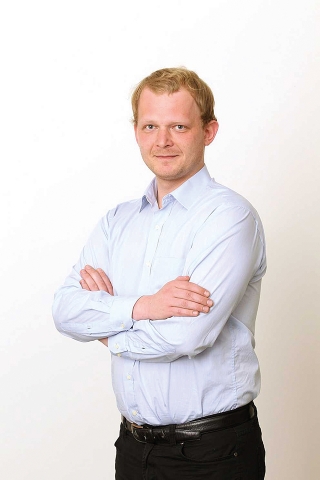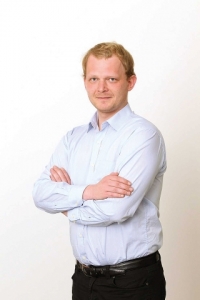Atlantic Council's Kalensky on the EU, Russia & the Disinformation Campaign
Interview
Mr Jakub Kalensky, a Senior Fellow at the Atlantic Council's Digital Forensic Research Lab (DFRLab) based in the Czech Republic, wrote a testimony for the US House Foreign Affairs Subcommittee on Europe, in which the first important point he makes is that the hybrid warfare intensified after the Maidan events, although the information warfare had likely been around for centuries. The testimony, however, failed to mention Georgia, particularly the 2008 war. The Georgian Institute for Security Policy (GISP) met him to ask if this was a sign that Russia was successfully selling the world its narrative.
“What I mentioned there is that this on-going, daily disinformation campaign began with the Maidan events, but I also said that there have been some isolated incidents before,” Kalensky told us. “I would definitely say that the 2008 war in Georgia was one of these incidents and they definitely tried to spread lies, but from what you read in reports, articles or studies, it looks like Russian leadership evaluated this information operation not entirely successful. But yes, if there are Westerners saying that Georgia was the aggressor then obviously that's a victory for Russian propaganda”.
Do you think the West realized that it is taking part in an information war?
That's actually a question I keep asking myself. I think we have to understand the fact that whereas the Russians understand that they are in an information war with the West, the West or most of the West doesn't understand it. Europe still likes to play chess with the Kremlin, while the Kremlin is already punching them in the face. Obviously you can pretend we are still playing chess because we are gentlemen and we do not punch our partner, but if the other one is punching you, it's going to have only one rather violent outcome.
Is the West reluctant to see the gravity of the situation?
On meeting a European counterpart, a Russian will not openly state “we are in an information war.” I don't think the West has perceived this message and I don't think the West would draw any consequences from it. The wording of the European Union does not use words like information war or information conflict. The West clearly doesn’t see itself in a conflict with Russia, whereas Russia does. This is an asymmetrical relationship and that is actually a horrible part of this situation. The cost is being paid by Ukrainians and Georgians, and this conflict is costing these countries their territories. What price does the West pay? Well you can say that Russian efforts to divide Europe are being very successful. They try to meddle in US affairs, they are even trying to help Brexit along, and I think they will be very happy with how it is developing. Have a look at Italy where the Russians tried to meddle information-wise in the 2016 constitution referendum and then in the 2018 parliamentary elections. The Russians did basically anything they could in Italy and what was the reaction? Where is the red line? Very good question, I don't have the answer.
Why are the Kremlin’s fake news tactics so persuasive? What makes the Kremlin's speech so powerful and so hard to resist?
Very often, the lie is more appealing than the truth. Sometimes the lie is simply sexier. Garry Kasparov says that disinformation has a comparative advantage to the truth because the truth is only one, whereas there are hundreds of ways to lie about it. So this is one of the advantages for the liar. You can have much more benefit for lower cost. You need to simply find people who want to believe the lies because they do not want to blame themselves for their miserable lives and they want someone else to blame- “it's not my fault that I'm jobless and that I can't speak any other foreign language”. You would still find the people who are nostalgic for the soviet times. You could find such people in the EU, probably around the communist parties, but then you could find people who are ideologically aligned to Russia because it's defending traditional values.
What about the Putinversteher phenomenon in Europe? Is it the man’s charisma? The “ideals” he stands for?
Many people think Putin is a strong leader and you can't deny that if you don't mind the fact he is a dictator and mass murderer, a kleptocrat who has stolen the country from Russians, then yes, he is a strong leader, but I believe that he would run the country more effectively if he had no opposition and journalists covering him. People are attracted to strong people: this is human nature. It might be that some people really believe the nonsense that he’s protecting their traditional values. You would see some still thinking about Russia as this great literature and ballet somewhere in the 19th century. But I’m not a hundred percent sure that Gogol would agree with Russian activities in Ukraine.
What is stopping the EU from taking action? You used to work for The East Stratcom - Do the suits in Brussels really believe that East Stratcom, one small department, can tackle Russian disinformation?
If I am not mistaken, East Stratcom was created by the European Council, the European heads of states themselves, not EU officials sitting with the heads of states, in March 2015. Apparently, the EU has acknowledged they have a problem; understood that something new had to be tried. I came to Brussels when this team was launched in Autumn 2015. Some of the people who were in Brussels said that one of the major turning points was the MH 17 incident, which was actually mostly driven by Poles and the Baltic nations. I was responsible for countering disinformation, trying to connect the experts and journalists in Europe working on this topic. We were simply trying to collect and give more exposure to all that these organizations had found. If we could connect fifty, sixty cases of disinformation per week, we could already see a trend: that this week they’re focusing more on Syria, that week they’re focusing on MH 17. So in the beginning it was really connecting people who were willing to help us for free just because of the cause, and that's where I spent most of the time- finding these people.
One of the main tools to combat disinformation is raising the awareness of the general population. How are things faring on that front?
The direction is right, but the movement should be faster. You can see that more people are acknowledging that this is a problem; you can see more initiatives starting in particular member states and this is truly important. I even mentioned that people in suits who speak English have very limited audiences. We have to have law collectors talking to pensioners, to people in the village, to local students, and these are not people from Brussels: these are Georgians talking to Georgians and Czechs talking to Czechs. So I am really happy to see that there are more and more of these initiatives. The more local the reaction, the better and the more persuasive it will be. However, I still say we need much more.
INTERVIEWER: Here is a scenario for disinformation. Imagine I'm an Albanian and you explain to me the seven stages of EU accession that France seems to be so adamant on. I worked so hard; I wanted to be in the European Union for so long; I made so many reforms; and I see countries in there that haven't made so many reforms, which are lower on the democracy index, lower on the corruption index. And yet you imposed on me these seven stages of accession that might delay my membership indefinitely. How do you sell that idea?
“I don't want to sell it to you because I don't want to defend them,” Kalensky answers. “I think the position is indefensible. Real strategic communication actually influences the political decisions. If you can't communicate the decision, it's probably a very bad decision, right? People at Stratcom might be forced to communicate this and I don't envy them. I wouldn't want to communicate it because I think it’s one of the worst messages the EU could assign its Eastern and Southern neighbours and I cannot imagine how disappointed these nations must be.”
INTERVIEWER: Then there was this NATO being “braindead” comment from French President Macron, followed by his recent statement that he doesn’t see Russia as an enemy of NATO. Sell that idea now to Georgians who wanted to be in NATO. We have sent the largest component to Afghanistan among all NATO member countries.
“I cannot. I wouldn't be able to explain it to Georgians, I wouldn't be able to explain it to Ukrainians and North Macedonians. I simply think this shouldn't have happened. That is the only thing I can say.”
A large segment of society here in Georgia thinks that what we see now in Russia is tied to Putin but when Putin is gone the situation might get better. We just have to wait. What do you think?
I am afraid this is too optimistic. We do not have a Putin problem, we have a Russia problem. Putin is actually very consistent, he acts like a typical tsar, he behaves like typical communist parties. But this new “Medvedev”? I think we will hear how he is much more pro-West and he is not like Putin at all, and in five years we will have the same problem. If you don't get out of Crimea, if you don't get out of Ossetia and Abkhazia, there is no difference. I am not sure whether we will ever have political leaders who are strong enough. If Europe doesn't act according to the situation, doesn't understand that we are in a conflict with Russia, then no, Russia has no reason to change.
By Vazha Tavberidze for GISP
Image source: respekt.cz












